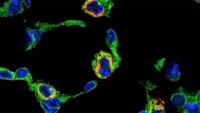Our Research

Investigating the Genetic Basis of Monogenic Adult-Onset Lung Fibrosis
The Garcia Lab investigates the genetic basis of monogenic adult-onset lung fibrosis. We have partnered with familial pulmonary fibrosis (FPF) kindreds and individuals with idiopathic pulmonary fibrosis (IPF) to investigate the genetic underpinnings of adult-onset disease. We have identified rare variants in genes belonging to the surfactant (SFTPA2), telomerase (TERT, TERC, RTEL1, PARN) and mitotic spindle (KIF15) pathways. Each of the disease variants is individually rare and typically private for the family in which it is discovered. However, collectively, rare coding variants are found in ~25% of all FPF kindreds and ~5% of IPF patients.
Adult-Onset Pulmonary Fibrosis Caused by Mutations in Telomerase

Proc Natl Acad Sci USA. 2007.
Genetic Defects in Surfactant Protein A2 Associated with Pulmonary Fibrosis and Lung Cancer

Am J Hum Genet. 2009.
Exome Sequencing Links Mutations in PARN and RTEL1 with Familial Pulmonary Fibrosis and Telomere Shortening

Nat. Genet., 2015.
Rare and Common Variants in KIF15 Contribute to Genetic Risk of Idiopathic Pulmonary Fibrosis

Am. J. Respir. Crit. Care, 2022.
Using Human Kindreds and Cohorts to Translate Genetic Discoveries
We use human kindreds and cohorts to translate genetic discoveries. We have defined the spectrum of pulmonary fibrosis phenotypes associated with rare variants in telomere-related genes (TERT, TERC, PARN, RTEL1). Regardless of diagnosis or gene mutation, patients typically demonstrate clinical progression. Individuals with inherited pathogenic telomere-shortening mutations have an increased frequency of somatic TERT promoter mutations in leukocytes, which lead to increased telomerase activity and a selective advantage for cell growth and replication.
We have shown that leukocyte telomere length is directly associated with transplant-free survival for IPF patients. Telomere length predicts the rate of pulmonary function decline and adverse effects of immunosuppressive medications. We have begun to investigate the clinical utility of measuring telomere length in the ILD clinic to personalize patient care.
We have leveraged the cohort of patients hospitalized at New York Presbyterian Hospital/Columbia University Irving Medical Center at the start of the pandemic to characterize the post-acute sequelae of COVID-19, including pulmonary fibrosis.
Somatic mutations in telomerase promoter counterbalance germline loss-of-function mutations

J Clin Invest. 2017.
Telomere-Related Lung Fibrosis is Diagnostically Heterogeneous but Uniformly Progressive

Eur Respir J. 2016.
Effect of Telomere Length on Survival in Idiopathic Pulmonary Fibrosis: an Observational Study With Independent Validation

Lancet Respir Med. 2014.
Telomere Length and Use of Immunosuppressive Medications in Idiopathic Pulmonary Fibrosis

Am. J. Respir Crit Care Med. 2019 Aug 1; 200(3):274-275.
Pulmonary Fibrosis Four Months after COVID-19 is Associated with Severity of Illness and Blood Leukocyte Telomere Length

Thorax. 2021.